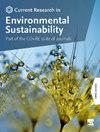繁荣的未来源自繁荣的过去:培养危地马拉对激进粮食系统替代方案的想象力
IF 3.7
Q2 ENVIRONMENTAL SCIENCES
Current Research in Environmental Sustainability
Pub Date : 2024-01-01
DOI:10.1016/j.crsust.2024.100270
引用次数: 0
摘要
转型意味着需要从根本上改变当前的现实。这就需要从根本上重新构想当前的系统。近年来,出现了专门为想象转型而设计的各种面向未来的做法,包括 "颠覆性种子 "方法(DS)。颠覆性种子 "方法侧重于自下而上的创新举措(种子),这些举措具有扩大影响、挑战不可持续的系统、促进转型变革的潜力。本文报告了首次在实践中应用 "破坏性种子 "方法的情况,该方法是危地马拉粮食系统转型项目的一部分。DS 主要与代表小农社区的土著行动者合作,在想象理想未来时强调他们的观点和目标,显示出巨大的潜力。利用边缘化的视角和知识来源,它可以帮助推进转型变革的概念化,从而真正促进社会公平和正义。此外,这种方法还有助于建立一个包容性的平台,以阐明和质疑权力动态。DS 方法最初是在全球北方背景下开发和测试的,它显示了在不同背景下的适应性,包括全球南方的土著社区。研究结果强调了植根于土著世界观的集体想象力的变革潜力,它为不可持续和不公正的现实提供了替代方案,挑战了主流叙事,有助于实现更加公正和可持续的未来。更广泛地说,它展示了想象变革的巨大潜力,挑战了主流政治结构和想象,强调了社会正义和公平问题。它显示了将通常被边缘化的社区的知识、观点、价值观和想象力纳入可持续发展转型对话的价值。本文章由计算机程序翻译,如有差异,请以英文原文为准。
Prosperous futures inspired by prosperous pasts: Fostering imagination of radical food system alternatives in Guatemala
Transformations imply the need for radical alternatives to current realities. This requires a fundamental reimagination of current systems. Different future-oriented practices specifically designed for the imagination of transformations have emerged in recent years, including the Disruptive Seeds approach (DS). DS focuses on innovative bottom-up initiatives (seeds), that show potential to grow in impact and challenge unsustainable systems, contributing to transformative change. This paper reports on the first time DS was applied in practice, as part of a project focusing on food systems transformation in Guatemala. Working primarily with Indigenous actors representing smallholder communities, DS shows great potential when it comes to emphasizing their perspectives and objectives in the imagination of desired futures. Tapping into marginalized perspectives and sources of knowledge, it can help advance the conceptualization of transformative change that truly contributes to social equity and justice. Moreover, the approach facilitates an inclusive platform for articulating and interrogating power dynamics. Initially developed and tested in Global Northern contexts, the DS approach demonstrates adaptability across diverse contexts, including Indigenous communities in the Global South. Findings underscore the transformative potential of collective imagination rooted in Indigenous worldviews, offering alternatives to unsustainable and unjust realities, challenging dominant narratives and contributing to more just and sustainable futures. More generally, it demonstrates huge potential for imagining transformations, challenging dominant political structures and imaginaries, emphasizing issues of social justice and equity. It shows the value of incorporating the knowledge, perspectives, values and imaginaries of—often marginalized—communities into conversations about sustainability transformations.
求助全文
通过发布文献求助,成功后即可免费获取论文全文。
去求助
来源期刊

Current Research in Environmental Sustainability
Environmental Science-General Environmental Science
CiteScore
7.50
自引率
9.10%
发文量
76
审稿时长
95 days
 求助内容:
求助内容: 应助结果提醒方式:
应助结果提醒方式:


